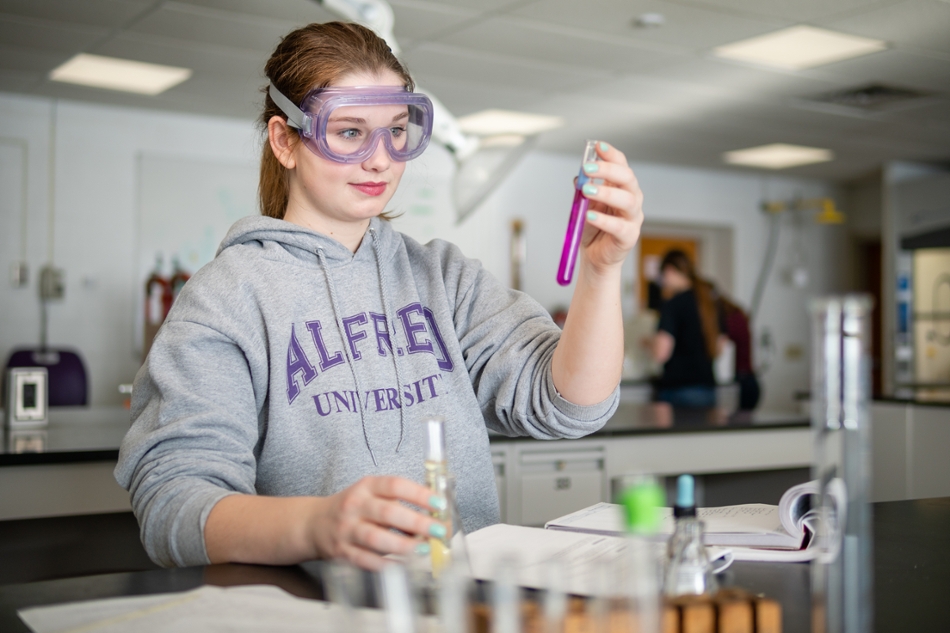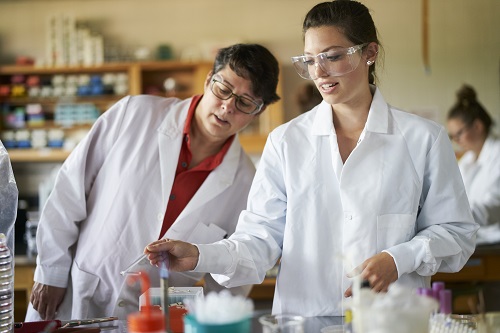Chemistry (BA)
Insatiable, Lifelong Learning
Our Chemistry program is designed to promote and support your intellectual curiosity now and throughout your career, develop an ability to solve problems efficiently, and communicate the nuances of chemistry effectively with all audiences. Our graduates enter the workplace with a clear understanding of the place of chemistry within natural science and a comprehension of the relationship between natural science, the environment, and the rest of human culture.
The ACS-approved degree requires the core major plus six additional credit hours. Students completing the additional credits will be certified to ACS upon graduation and are immediately eligible to join ACS. Students who intend to pursue graduate studies in chemistry or who desire a nationally certified degree should consider the additional course work.
Courses for the Major:
- CHEM 105/106 General Chemistry
- CHEM 105L/106L General Chemistry Lab
- CHEM 315/316 Organic Chemistry
- CHEM 315L/316L Organic Chemistry Lab
- CHEM 321 Introduction to Analytical Chemistry
- CHEM 340/342* Physical Chemistry Quant. Mech./Thermodynamics
- CHEM 341 Physical Chemistry Laboratory
- CHEM 372 Inorganic Chemistry
- CHEM 374 Inorganic Chemistry Laboratory
- CHEM 423 Instrumental Analysis
- CHEM 461 Advanced Chemistry Laboratory
- CHEM 490 Chemistry Seminar
Courses for the ACS-approved Major:
Above, plus six additional credit hours. These six credits must include BIOL 420 (Biochemistry: Proteins and Metabolism) and at least two credit hours from CHEM 400, CHEM 414, CHEM 450, CHEM 457, CHEM 462, CHEM 485, CHEM 495, CEMS 334, CEMS 342, CEMS 344, CEMS 349, and CEMS 434. These two credits must also include at least 24 clock hours of laboratory time.
Related Courses for the Major:
- MATH 151/152 Calculus I and II
- PHYS 111 or 125 Physics I
- PHYS 112 or 126 Physics II
- For those students who wish to earn the ACS certified degree, BIOL 202 (4 credits) is also required as a prerequisite for BIOL 420.
The core major provides a firm background for entry into the chemistry job market, for advanced study in the discipline, for advanced study in a related discipline, or a foundation for various professional schools such as medicine, dentistry, veterinary medicine, law or library science.
In addition to fulfilling the requirements of the major in Chemistry, as well as the College of Liberal Arts & Sciences general education requirements, you'll be required to complete the College's First Year Experience Program or Transfer Student Program.
Chemistry as a double major is available to any AU student. To earn a Chemistry double major, take all courses listed below, totaling 50-55 credits. All Chemistry double majors complete a common core and related courses.
Learn more about Double Majors
All courses taken as part of the Chemistry major must be passed with a grade of C or better; transferred courses not already described in pre-existing articulation agreements must have approval from the Division of Chemistry to receive major credit. Any lab courses indicated as having been delivered in an online format are not accepted by the Division of Chemistry.
Chemistry Core Courses: Take all from this section (38-43 credits)
- CHEM 105: General Chemistry I
- CHEM 105L: General Chemistry I Lab
- CHEM 106: General Chemistry II
- CHEM 106L: General Chemistry II Lab
- CHEM 315: Organic Chemistry I
- CHEM 315L: Organic Chemistry I Lab
- CHEM 316: Organic Chemistry II
- CHEM 316L: Organic Chemistry II Lab
- CHEM 321: Intro to Analytical Chemistry or
- CHEM 340:Physical chem-Quant. Mech
- CHEM 342: Physical Chem-Thermodynamics or
- CEMS 214: Structure and Property of Materials* and
- CEMS 235: Thermodynamics of Materials** and
- CEMS 344: Properties II: Electrical, Magnetic, and Optical
- CHEM 341: Physical Chemistry Lab
- CHEM 372: Inorganic Chemistry
- CHEM 374: Inorganic Chemistry Lab
- CHEM 423: Instrumental Analysis or
- CEMS 347: Spectroscopy and
- CEMS 349: X-ray characterization
- CHEM 461: Advanced Lab I
- CHEM 490: Chemistry Seminar
Related Courses: Take all from this section (12 credits)
- MATH 151: Calculus I
- MATH 152: Calculus II
- PHYS 111: Intro-General Physics I or
- PHYS 125: Physics I
- PHYS 112: Intro-General Physics II or
- PHYS 126: Physics II
* Class has been discontinued as of Spring ’24. Students already enrolled and soon graduating have taken this class. This class is now ENGR 204; changes will be made to the catalog when it is opened for updates.
** Class has been discontinued as of Spring ’24. Students already enrolled and soon graduating have taken this class. This class is now CEMS 204; changes will be made to the catalog when it is opened for updates.
A chemistry minor enables students to tailor their studies to complement a major in other fields. For example, a biology major might emphasize organic chemistry whereas a student in ceramic science might focus on inorganic chemistry.
- CHEM 105/106 General Chemistry
- Plus at least 12 additional credits from the following: CHEM 310 (may not be credited if passing grade in CHEM 315), CHEM 313, CHEM 315, CHEM 316, CHEM 321, CHEM 343, CHEM 345, CHEM 346, CHEM 370, CHEM 372, CHEM 374, CHEM 423, CHEM/BIOL 420, and CHEM/BIOL 422
Most chemists are employed in industry, academia, and the government. Chemists are needed for consulting businesses, research, health care and hospital settings, laboratories, biotechnology, and in all kinds of high-tech areas. Nationally, about half of all bachelor’s degree chemistry majors go on to some type of graduate school in the sciences, medicine, dentistry, veterinary medicine, law, or education. Others enter the workplace as:
- Laboratory technician
- Health administrator
- Quality control specialist
- Nutritionist
- Flavor analyst
- Environmental consultant
- Pharmacologist
- Patent attorney
- Research chemist
- Instrumentation specialist
- Safety engineer
- Chemical plant supervisor
- Soil and water analyst
- Chemical technologist
- Industrial health engineer
- Fiber analyst
- Geochemist
- Biomedical engineer
- Biochemist
- Technical writer
- Chemical engineer
- Medical illustrator
- Magnetochemist
- Pollution control chemist
- Pharmaceutical sales representative
- Chemistry teacher
Student Stories
Similar Programs
Students interested in a major in Chemistry may also be interested in pursuing these other areas of study:






